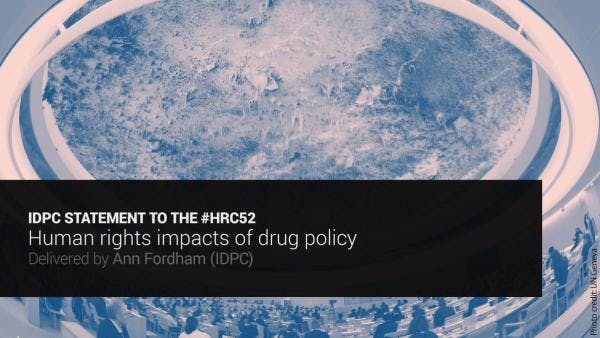UN Geneva
On the human rights impacts of drug policy - IDPC Statement to the 52nd session of the Human Rights Council
52nd session of the Human Rights Council (27 February – 4 April 2023)
High Level Segment
Statement delivered by the International Drug Policy Consortium
Mister President,
For over 50 years, the so-called ‘war on drugs’ has brought about a global, pervasive and systematic human rights catastrophe that requires the continued attention of the Council. Its most salient manifestations include the death penalty for drug offences, extrajudicial killings, arbitrary detention in certain ‘drug rehabilitation centres’, mass incarceration, criminalisation, and the militarised eradication of crops. Worldwide, only 1 in 8 people with drug dependence have access to evidence-based health interventions. Life-saving harm reduction services remain chronically underfunded and unavailable, fuelling the HIV epidemic and a catastrophic rise in overdose deaths.
The Council has a critical role in ending this devastation. Therefore, we strongly welcome the initiative to table a new resolution on the human rights impacts of drug policy at this session of the Council. This resolution, which should include a standing mandate for OHCHR to periodically report back to the Council on the human rights impacts of drug policy, will guarantee that the UN human rights system has a strong voice in the review of the global drug control regime that will take place at UN level throughout 2023 and 2024 – and beyond.
The resolution is also closely aligned with new initiatives emerging across the human rights system, such as the 2021 study on drug policy by the Working Group on Arbitrary Detention, and the recent announcement that the Committee on Economic, Social, and Cultural Rights will initiate a General Comment on drug policy. Civil society looks to the Council for leadership in encouraging and welcoming these initiatives and ensuring that they are presented to the UN Commission on Narcotic Drugs. The UN can no longer a blind eye on the human rights impacts of drug policy.
Joint statement signed on by:
- International Drug Policy Consortium (International)
- Centre on Drug Policy Evaluation (Canada)
- Centro de Estudios Legales y Sociales – CELS (Argentina)
- Drug Policy Alliance (United States of America)
- Harm Reduction International (International)
- Helsinki Foundation for Human Rights (Poland)
- Instituto Ria (Mexico)
- Intercambios Asociación Civil (Argentina)
- Penal Reform International (International)
- Students for Sensible Drug Policy (International)
- Washington Office on Latin America (United States of America)
